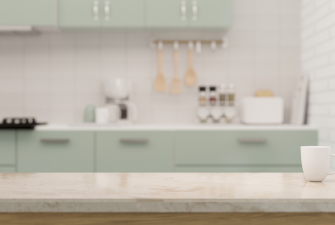The kitchen countertop is probably one of the most important parts of your kitchen. Aside from serving as the primary working surface, it is also aesthetically important.
One of the hardest questions people may have to decide when installing countertops is how thick and wide they should be. In fact, you may be checking this article out because you have the same issue right now.
Kitchen countertops are usually about 1 to 3 cm thick or about 0.4 to 1.18 inches. An average kitchen countertop is usually 25.5 inches (about 64 cm) wide, with 28 inches (about 71 cm) also available. 25.5 inches width allows for a 1.5-inch overhang over a 24-inch deep base cabinet.
This article discusses the width and thickness of a kitchen countertop. We also look at how you can choose a suitable countertop for your kitchen.
What Are Kitchen Countertops Made Of?
Kitchen countertops are usually made of natural stones such as granite, sandstone, quartz, or marble. Many are also made of wood, laminated resin, plastics, and concrete. Some may be lined with sheet metal for better durability and ease of cleaning.
Kitchen countertops are the flat, horizontal surface on top of base cabinets. They are usually meant to serve as the main working surface in the kitchen. You will spend time preparing and cooking food with the countertop. Sometimes, you may also be serving and eating food from it.
The countertop is easily the most used surface in the kitchen. This means they are usually made from durable, hard materials. Affordable kitchen countertops are usually made of laminated plastic and resin. These durable, easy-to-clean surfaces are easily maintained and replaced if needed.
Solid wood countertops may vary in price, depending on the types of wood and the layout. Wood countertops are also good for countertops, although they catch kinks and pits easier.
In the higher-priced range, the most expensive countertops are made of natural stones. These include granite, quartz, and marble. Marble countertops are usually the most expensive.
High-grade marbles like Carrara, Thassos, or Emperador Gold will fetch top dollars. They may cost even more if you demand perfectly smooth surfaces without pits.
There are also alternative countertop materials such as concrete or metal. Sheet metal may also be used as the surface on top of the countertop to increase durability and make clearing easier.
How Wide And Thick Are Kitchen Countertops?
Kitchen countertops range from 1 to 3 cm thick or about 0.4 to 1.18 inches. The kitchen countertops are about 25.5 inches (about 64 cm) wide. There are also 28 inches (about 71 cm) wide countertops. But they are less common.
One of the biggest questions about kitchen countertops is the sizing. Specifically, the thickness and the width of it. You can usually quickly tell the length we need based on your base cabinet units.
For thickness, the common thickness is between 1 to 3 cm thick, or about 0.4 to 1.18 inches. In many cases, your decision on how thick your countertops are may depend on the material, durability, and maintenance.
Countertop width refers to how ‘deep’ it is. Another way is to see how far it protrudes from the backing wall. Generally, kitchen countertops are about 25.5 inches (about 64 cm) wide. There may also be wider countertops up to 28 cm, but these are not common.
The rationale for the 25.5 inches wide cabinet is that it allows about 1.5 inches of overhang from a common 24-inch deep cabinet. Suppose you use any countertop wider than 25.5 inches.
In that case, you may want to consider upgrading to a larger cabinet or going thicker. This ensures the overhanging parts can handle the stress you will put on them.
How To Pick Width And Thickness For Kitchen Countertops?
Several factors should be considered when deciding on kitchen countertop width and thickness. They are durability and maintenance, material, and base cabinets. You may need to balance these factors to get the best results for your kitchen.
Picking kitchen countertops is not exactly a walk in the park, but it’s not rocket science either. The key is to understand several important aspects to consider before making your decision. These aspects are:
Material
If you are to use a more fragile material for your countertop, such as sandstone, you may want to go thick and less wide. This helps to make the countertop stronger and prevent it from breaking apart.
Suppose you are going for very expensive materials, such as Carrara marble. In that case, you may consider getting a thinner countertop, which could mean some good savings.
Durability and Maintenance
If you want a countertop that will take everything you can dish at it, you want to go as thick as possible. Also, use regular width since too much overhang may reduce your countertops’ durability.
Base Cabinets
Another aspect you want to think about is your base cabinets. Suppose your base cabinets are made of lighter, less durable materials such as laminated, reconstituted wood. In that case, a thick countertop may not be a good idea since it will be heavy.
You also want to consider the width and decide on how much overhang you want. The more overhang you want, the thicker the countertop needs to be.
This ensures the countertop keeps its structural rigidity and can handle weights on the overhanging edge.
What Is the Best Depth for Different Types of Kitchen Countertops?
When choosing the right counter depth for your kitchen, it’s important to consider the type of countertop material. For quartz and granite countertops, a standard depth of 25 inches is recommended. However, for laminate or wood countertops, a depth of 24 inches is more suitable. Consider your material before deciding.
Final Thoughts
Choosing the right thickness and width for your kitchen countertop is an important decision that should not be taken lightly.
The standard thickness and width options provide a good starting point, but it’s important to consider your individual kitchen needs and preferences when making your final decision.
Take the time to research different materials and styles, and don’t be afraid to consult with a professional to ensure that you make the best choice for your home.

